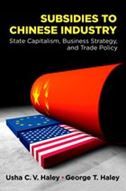Subsidies to Chinese Industry: State Capitalism, Business Strategy, and Trade Policy
Publisher:
Oxford University Press
Publication:
6/2013
Languages:
English
Binding:
Hardcover
ISBN/SKU:
9780199773749
Pages:
240
Sizes:
235 x 156mm
Weight:
0.5270
In Stock (Only 1 copy left)
To be dispatched within 1 business day
To be dispatched within 1 business day
£22.50
£22.50
(€25.20)
How did China move so swiftly in capital-intensive industries without labor-cost or scale advantage from bit player to the largest manufacturer and exporter in the world? This book argues that subsidies contributed significantly to China's success. Industrial subsidies in key Chinese manufacturing industries may exceed thirty percent of industrial output. Economic theories have mostly portrayed subsidies as distortive, inefficiently reallocating resources according to non-market criteria. However, China's state-capitalist regime uses subsidies to promote the governments' and the Communist Party of China's interests. Rather than aberrations, subsidies help Chinese businesses and governments produce, stabilize and create common understandings of markets; the flows of capital reflect struggles between critical Chinese actors including central and provincial governments. Concepts of state capitalism including market-transition theory, the multi-organizational Chinese state, and state as paramount shareholder, create complex and relevant understandings of Chinese subsidies. The authors develop independent measures of industrial subsidies using publicly-reported data at firm and industry levels from governmental and private sources. Subsidies include free to low-cost loans, subsidies to energy (coal, electricity, natural gas, heavy oil) and to key inputs, land and technology. Four sequential studies identify the growth of subsidies to Chinese manufacturing over time and effects on world industry: steel (2000-2007), glass (2004-2008), paper (2002-2009) and auto parts (2001-2011). Subsidies to Chinese industry affect and are affected by business strategy and trade policy. Business strategies include lobbying for subsidies and for protection from subsidized foreign competitors and managing supply chains to guard against whiplash effects of uncoordinated subsidies. The subsidized solar industry highlights how global business strategies and decisions on production location and technology development respond to production or consumption subsidies and include market (competitive) and non-market (political) strategies. The book also covers government policies and regulation on subsidies broadly focusing on domestic consumption (antidumping and countervailing duties) and domestic production (indigenous innovation).
Readership: Primary audience: Trade Policymakers in the USITC, USTR, EU, Australia, etc. ; Decision makers and Analysts on Trade at NGOs such as the WTO, ASEAN, IMF, World Bank; Academics in International Business, Political Economy, Economic Sociology, International Business Strategy and Chinese Studies. The book will also interest (and has already received interest) from industry analysts in Steel, Glass, Paper and Auto Parts because of the way in which the calculations of subsidies was done. Institutional suspicion of Chinese reported data on firms has increased, incouding from the SEC. Additionally manufacturing oriented business associations and organizations, particularly those comprised of small and medium sized manufacturers, have shown an interest in the book and its findings.
Readership: Primary audience: Trade Policymakers in the USITC, USTR, EU, Australia, etc. ; Decision makers and Analysts on Trade at NGOs such as the WTO, ASEAN, IMF, World Bank; Academics in International Business, Political Economy, Economic Sociology, International Business Strategy and Chinese Studies. The book will also interest (and has already received interest) from industry analysts in Steel, Glass, Paper and Auto Parts because of the way in which the calculations of subsidies was done. Institutional suspicion of Chinese reported data on firms has increased, incouding from the SEC. Additionally manufacturing oriented business associations and organizations, particularly those comprised of small and medium sized manufacturers, have shown an interest in the book and its findings.




